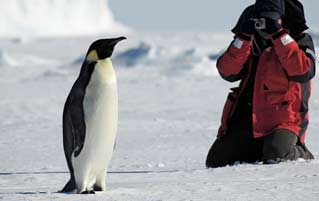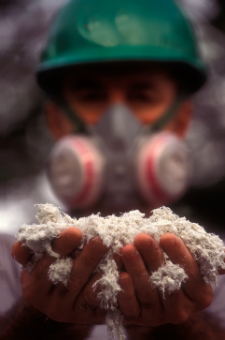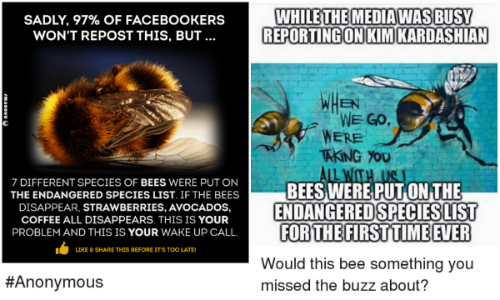7 Pieces Of Good News About Huge Stories (No One Told You)

If you get your news from ... well, the news, you'd be forgiven for thinking that human civilization is on a swift and violent free fall down the proverbial pooper. Hell, even the earth itself has had enough of our bullshit and is trying to get rid of us by messing with the thermostat, liked a pissed-off landlord.
Enlightened types have been talking about fixing this mess we're in for decades, but what have we got to show for it, other than a bunch of sappy songs and after-school specials? A whole lot, actually. As we like pointing out, there is good news happening these days; it's just that no one bothers giving it to you. For example, did you know that...
Fewer And Fewer People Are Dying Of Cancer
There's a whole industry built around tricking people into clicking on shady sites by telling them we finally found a cure for cancer, but let's face it: that's never gonna happen. What we call "cancer" is actually a collection of over a hundred related diseases, and nothing short of Harry Potter magic could get rid of them all. Might as well go back to injecting nicotine and snorting asbestos like we did in the '50s, everyone!

"How I've missed you, sweet nectar."
The Good News:
We haven't stopped cancer, but we're getting pretty good at taming the son of a bitch. Here's the cumulative number of people cancer has (and hasn't) killed since the '70s:

The red line represents the Mad Men universe.
Much like Clint Eastwood's characters, cancer has been getting dramatically less deadly in recent decades. Cancer deaths peaked in 1991 but had declined by 23 percent as of 2012, which translates to over 1.7 million Grim Reaper snubs. While some auxiliary cancer diagnoses are on the rise, actual deaths are down, especially in regards to the big four: breast, lung, prostate, and colorectal (yeah, a lot of things can go wrong up your butt).
So why the big change? Surely not all of that can be chalked up to the prolonged absence of the McRib. The boring answer: all those awareness campaigns and research fundraisers worked. Colorectal cancer deaths are on a 50 percent downswing due to a societal shift towards vigilant rectal care -- more men and women seeking colonoscopies, which can nip pre-cancerous polyps (literally) in the bud. Prostate cancer deaths, meanwhile, have dropped in half partially due to less stringent testing protocols, with many doctors ditching the types of tests that have a propensity for over-diagnosing friendly, transitory cancers that are best left to their own devices.

"See, your cancer really is a nice guy once you give him a chance."
Ovarian cancer deaths are also in decline -- 10 percent in Europe and 16 percent stateside -- and will continue to drop, due to increased contraceptive use. Breast cancer: 36 percent fewer deaths since their 1989 zenith, thanks to improved detection and treatment methods. Lung cancer: 38 percent decrease in deaths for men, because those gross pictures on cigarette boxes are doing their goddamn job. Not a bad haul for the fattest, slobbiest version of humankind to ever exist.
Bees Are Probably Going To Be Just Fine
You've read the articles or, at the very least, seen the Facebook memes: bees are dying off, and once they're gone, we're next. Bees help flowers do the nasty and allow us to grow our food, which you might recognize as something we need to continue living. How fucked are we, exactly? Well, you saw headlines saying bees were just put on the endangered species list so, you know, pretty fucked, probably.

Just a thought, but maybe more people would share this if the word "be" wasn't misspelled.
The Good News:
Bees did go through a pretty rough patch there ... and by "there," we mean 10 years ago. The U.S. bee population hit a low point in 2006 with 2.5 million colonies, but by 2015, that number was up to 2.66 million, a two-decade high. Beekeepers saw the problem and have been working their asses off to reverse it -- if anything, we should be worried about them going extinct.

Above: not the worst bee-related catastrophe of 2006.
Bee populations have also been going up in other parts of the world. So why were they put in the endangered species list, then? Because seven bee species, all of them from Hawaii, haven't been doing so well and we need to protect them -- that's what the "endangered" status is all about. It's more of a tactical move to make sure the government actually gives funds to help those Hawaiian bees' population go up. By the way, we're talking about seven species out of the 4,000 ones existing in the U.S. alone. There's still a shitload of bees out there, is our point.

As previously covered in Cracked.com's hit article, "4,000 Bees."
And even if something went horribly wrong, like all the bees simultaneously flying into space to chill on the moon, we'd still manage to get by. Sixty percent of crops grown in America develop perfectly fine without bees. Stuff like rice, corn, lettuce, and wheat aren't bee-reliant, which means you can stop stockpiling all that Mountain Dew for the apocalypse. But the important thing is: bees are still very, very far from going the way of the humpback whale or the bald eagle.
Actually, about those...
Many Long Endangered Species Are Coming Back
OK, so bees are doing fine, but once an animal is on the actual brink of extinction there's no coming back, right? This is pretty unfortunate for any species that happens to share a world with us -- it's estimated that current extinction rates are up to a thousand times higher than they would be if human beings weren't crowding up the place. We're guessing it's only a matter of time before the only wild creatures left are bacteria, cockroaches, and emperor penguins.

Because who'd want to eat this guy?* (*tastes of fishy assholes)
The Good News:
Humpback whales are better known for being an endangered species than for being animals. By 1966, our incessant harpooning had left about 5,000 in the entire world. Guess how many there are today: A thousand? Eight hundred? Six? Nope! There's freaking 100,000 or so worldwide. And they're having wet, colossal sex, so that number is gonna keep growing.

You're not the only one who sounds like Chewbacca during orgasm.
It turns out those "hey, everyone, cool it with the killing" laws actually work. Take the bald eagle, America's famously rare feathery embodiment. In 1963, only 487 nesting pairs were left in the wild, as a result of contamination of their food supply, habitat loss, and general human douchebaggery. However, since being protected by the Endangered Species Act, that number has gone up by nearly 50,000 percent, with an estimated 9,789 nesting pairs freedomin' it up across the good ol' U.S. of A today.
They're not the only iconic American species that has been Netflix'd from near oblivion thanks to conservationists' efforts. By the 1960s, the American gray wolf had almost disappeared entirely. Cut to today: their population has more than quadrupled in the Western Great Lakes, and they've been popping up again (or for the first time) across the country. Sleep tight, everyone.

According to experts, the only place in America they can never populate is Liam Neeson's New York home.
Another heart-warming success story is that of the giant panda. While there were as few as 1,000 in the wild in the 1970s, that number has nearly doubled thanks to the efforts of the Chinese government. Sure, that may not sound like a lot for a species whose females are only in season for a couple of days a year and whose males are packing an embarrassing 3cm long penis, but it's apparently good enough to take them off the endangered species list.
We're Getting Closer To Ending Malaria
Malaria is a disease that's been kicking our asses since before we even evolved the mostly hair-free, perfectly formed human buttocks we know and love today. It's been documented around the world since, well, we started documenting things, and is generally believed to have killed more people throughout history than any other disease. In the year 2000 alone, it was responsible for the deaths of 839,000 people, mostly children. But, whelp, what are you gonna do?
The Good News:
You fight the hell back, is what you do, and what we have been doing. And it's working! By 2015, those 839,000 deaths had dropped to 438,000 -- we sliced this bastard in half in only 15 years. Perhaps most impressively, the drop happened across all regions:

The whole world has united in one voice to say: "fuck mosquitoes."
The thing is, for most of history, we had no idea what caused this specific set of symptoms. "There's a butt-faced demon sitting on your bed" counted as an educated guess at one point. Now that we know the actual science behind the disease, we can work to stop it in a variety of ways, from boosting health systems in vulnerable areas to simple bednets.

Actual butt-faced demons remain untreatable, though.
As a result, an increasing number of countries are on the verge of eliminating malaria entirely. In 2014, thirteen countries had zero reported cases of the disease, with six reporting fewer than 10 cases. One of the biggest success stories is that of Sri Lanka, a country that might as well have renamed itself "MalariaLand" during the mid-20th century. Fast forward to modern day, and Sri Lanka has been officially declared malaria free by the World Health Organization.
That's huge, and no one's talking about it. (To be fair, it's hard scaring people about Zika for ratings if you just told them even the worst diseases are conquerable.)
The Newer Generations Are Ditching Homophobia
The shittiness of the present has a way of making us forget how bad things were in the past. For example: homosexuality wasn't only illegal in some states until 2003, it was actually considered a mental illness until not all that long ago -- the DSM-II (the American classification of mental disorders) only removed it completely in 1987. That means you could've taken your same-sex partner out to the opening night of Beverly Hills Cop II and potentially ended up in a mental institution.

"This ain't San Francisco Cop II."
But does this surprise anyone? Homophobia is so deeply ingrained that we still get waves of vicious pushback on issues like gay marriage. It's just the way people are, right?
The Good News:
According to a report from the Public Religion Research Institute, 7 percent of American millennials (those ages 18 to 35) now identify as LGBT -- up from the 3.5 percent a previous study found among American adults of all ages. Why is that? Some kind of evolutionary flip-switch designed to combat overpopulation? Have the kids been brainwashed by the gay agenda from Hollywood? Has someone been gaying up the water supply?
There's a better explanation: More people are willing to be open about their orientation because there is much less social stigma. Society has slowly but surely become more open and tolerant when it comes to sexuality, enabling more people to feel comfortable about expressing themselves when in the past they may have just hidden it (potentially even from themselves).

Or run for public office on an anti-gay platform. Ain't nobody gonna call you gay!
So, in reality, there are no more LGBT people than there used to be, just more people who feel able to be honest about it. Which is great news if you happen to think "preventing human misery" should be a priority in civilized society.

"Sure, millions of people are suffering in silence, but at least I don't have to answer awkward questions to my kid."
Global Overpopulation Is Slowing Down
Arguably, many of the biggest problems humanity faces today can be directly attributed to the simple fact that there's so damn many of us. During the 20th century (aka, 0.05 percent of modern humans beings' time on earth), we went from 1.6 billion to 6.1 billion. At that rate, we'll soon reach 10 billion and then 0, because we'll all die from overcrowding, lack of food/resources, or simply when the earth splits in half due to the weight.

If you think going to the DMV is hell, wait until the entire world is one big line.
The Good News:
We're currently at 7 billion! OK, that doesn't sound very encouraging, considering what we just said, but here's the important part: it took us 13 years to go from 6 to 7 billion, which is a year longer than it took us to go from 5 to 6. For the first time in history, our billion-reaching speed has slowed down -- and even the most pessimistic projections of the UN predict we'll continue slacking in that area.

This doesn't even account for the effect of VR porn and sexbots.
Some experts believe our overall numbers will peak as early as 2050. This not only has positive implications for the morning traffic and the wait in line at Starbucks, it also means we might actually make it through this whole mess without collapsing in on ourselves like a precariously growing house of cards. You see, while advances in technology and healthcare allow us to live longer, we're also becoming better educated as a species, which translates to better birth control and lower birth rates. (Plus, conventional wisdom says that the nerdier we become, the less likely we'll be to get laid, so...yay?)
Meanwhile, our ability to sustain a larger population is already being improved by current breakthroughs in artificial intelligence, digital manufacturing, food production, and responsible energy usage. We may be needlessly worrying about crowded cities and strained infrastructure, when what really awaits us is sitting back while a drone-butler feeds us fresh synthetic caviar.

Which is also a sexbot. Just to be clear.
Cleaner Energy Production Is Already A Reality
This is the big one, isn't it? It doesn't matter if we cure every cancer and bring back the dodo if we don't have a planet to stand on. Unfortunately, at some point we discovered that we could make obscene amounts of money by pumping toxic shit into the environment to power our industries -- and we'll probably keep doing that until everyone dies, or it stops being profitable.

"So I figure if we start burning plastic we can probably get a couple more yachts."
Yep, we're screwed.
The Good News:
Here's the thing: clean, renewable energy is proving to be even more profitable these days, and the industries are adjusting to it. For the first time, CO2 emissions are down during a period of economic growth, thanks to increased reliance on renewable energy sources.
American air pollution is clearing up as well -- there are more cars, but they're producing less nitrogen dioxide due to environmentally friendly regulations and advanced "green" technologies. The simple result is that our skies are cleaner. When the news does talk about this, they aren't quite sure how to handle it:

"Is ISIS the reason? We hope it's ISIS."
It's also been a bad time for coal, with renewable energy overtaking it in capacity for the first time in 2015. A whopping half a million solar panels were inaugurated every day in that same year, and even China deserves a pinch of kudos, erecting two new wind turbines per hour to partially offset its sky-murdering industrial expansion.
Several other countries are stepping up their renewable game: Costa Rica had recent success running on a Captain Planet-esque combination of geothermal, solar, wind, and hydropower for 76 consecutive days in 2016 and 2015, for a total of 150 fossil-fuel-free days. In France, the Alpine town of Albertville is powered by whey, or protein powder, a byproduct of Beaufort cheese manufacture. The local power plant combines the protein with bacteria, producing methane and carbon dioxide gases which power a generator and supply energy to 1,500 inhabitants -- yes, this town runs on cheese. That is the most French thing ever.

Next step: Replace all car wheels with these things, Flintstones-style.
In Europe, the Swedes have gotten so efficient at recycling that they must import 700,000 tons of trash from other countries to keep things running smoothly. Norway faces a similar problem, and the two countries compete for the world's garbage, forcing the Norwegians to settle for the United Kingdom's second-rate Eurotrash.
And so on. There's still a long way to go, but eventually, clean energy will completely overtake the filthy kind, and we'll have to find some other way to murder our planet.
Jonathan Milward is a cynical optimist living with his hot wife in Bedfordshire, England. Read about their unconventional take on parenting at http://www.oursprogblog.com. Mike Bedard is a comedy writer living in Los Angeles. Follow him on Twitter if you want to stay in the Bedard-loop.
For more reasons to not give up on the human race, check out 13 Awesome Photos That Will Make You Happy To Be Alive and 7 Things You Won't Believe Science Says Make You Happy.
Subscribe to our YouTube channel, and check out 4 Awesome Videos That Make You Happy To Be Alive, and other videos you won't see on the site!
Follow us on Facebook, and we'll follow you everywhere.